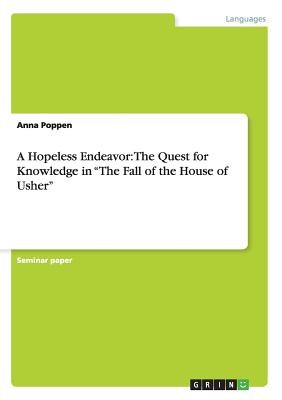| A Hopeless Endeavor: The Quest for Knowledge in The Fall of the House of Usher Contributor(s): Poppen, Anna (Author) |
|
 |
ISBN: 3656717753 ISBN-13: 9783656717751 Publisher: Grin Verlag OUR PRICE: $34.68 Product Type: Paperback Published: August 2014 |
| Additional Information |
| BISAC Categories: - Language Arts & Disciplines - Literary Criticism |
| Physical Information: 0.06" H x 5.83" W x 8.27" (0.10 lbs) 26 pages |
| Descriptions, Reviews, Etc. |
| Publisher Description: Seminar paper from the year 2012 in the subject English - Literature, Works, grade: 1,0, Carl von Ossietzky University of Oldenburg, language: English, abstract: The short story "The Fall of the House of Usher" is one of Edgar Allan Poe's most popular and most interpreted texts. Up to today, literary scholars argue about the proper meaning of the story. The text has been interpreted as a story of the supernatural, a tale of insanity, as a representation of romantic art, as a vampire story or as a text about incestuous love. Most interpretations aim at finding answers to the major questions raised in the short story. Scholars have tried to find reasons for the crash of the mansion, for Roderick's disease, for Madeline's death, for the supernatural vapour around the house, and many other issues that the story leaves open. However, a general answer to all the questions has not yet been found. In the following, I will prove that it is not necessary to find an answer to the inexplicable elements of the text, because they are part of the story's message. The chaotic, nonsatisfying ending of "The Fall of the House of Usher" is intended, because the story is about the difficulty or even impossibility of explaining the world. That is why Poe's short story "The Fall of the House of Usher" can be interpreted as part of what Hagenb chle termed "the epistemological crisis in nineteenth-century American thought". Using the example of Charles Brockden Brown's Wieland, Hagenb chle argues that at the beginning of the 19th century the foundations of human knowledge were questioned and fell apart. This thesis can be applied to other American authors besides Brockden Brown who also challenged established epistemological assumptions. In the following, I will argue that Edgar Allan Poe shows the limits of epistemology by creating characters who try to acquire knowledge through different approaches, but fail in the end. By doing this, he responds to his cultural and historical background |